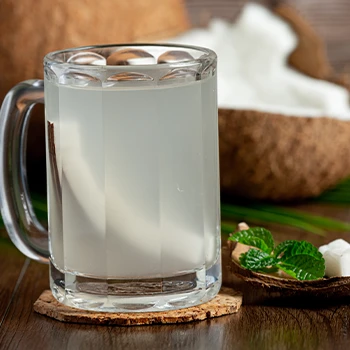As a certified personal trainer, I often peruse online forums to see what's new in the fitness world, and I've learned from numerous posts that many athletes drink coconut water before working out.
So, I set aside a few days to research and discuss the topic with our dietitian at Total Shape and see if coconut water could be a good pre-workout drink to give my clients more energy and strength while working out.
I compiled all my findings in this article, so continue reading to discover if coconut water can be an effective pre-workout drink.
Quick Summary
- Incorporating coconut water before workouts can enhance energy levels and stamina due to its rich electrolyte content, including calcium, manganese, and magnesium.
- While coconut water offers natural hydration and essential nutrients, it may lack certain elements, like protein, necessitating additional supplements for optimal workout performance.
- Coconut water contains about 40 to 60 calories in 8 ounces, making it a lower-calorie option compared to many sports drinks and beneficial for maintaining blood sugar levels.
- Based on my experience, coconut water is an excellent, natural alternative to commercial sports drinks, particularly for those seeking a refreshing and healthy boost before moderate exercise routines.
Is Coconut Water a Good Pre-Workout?

Yes, coconut water is a good pre-workout option.
As a fitness enthusiast, I've personally found that coconut water is a great choice for pre-workout. It's not just about the B vitamins like riboflavin (B2), niacin (B3), and pantothenic acid it contains. In my experience, these nutrients really do contribute to a noticeable boost in energy during my intense workout sessions. [1].
According to one of the studies from the National Center for Biotechnology Information website, coconut juice is high in nutrients and electrolytes, such as sodium, calcium, and magnesium, which help prevent muscle cramps, allowing you to exercise longer [2].
"During my training sessions in tropical countries, I've joined local athletes in choosing coconut water over manufactured sports beverages. Not only is it refreshing, but I've also personally experienced the natural weight loss benefits it offers, making it a staple in my fitness routine.
However, it may not provide the other nutrients needed to enhance focus and endurance. Given this, I usually advise my clients to take multi-ingredient pre-workout supplements to improve overall performance.
How Does It Work as a Sports Drink?
As a sports drink, coconut water works effectively by hydrating the body and providing essential minerals and natural carbohydrates. This combination has consistently offered me increased vitality and stamina during workouts, enhancing the pre-workout experience beyond just taste.
Some sports drinks have carbs like high-fructose corn syrup, sucrose, and dextrose, while others have low-calorie sweeteners that give them flavor.
Coconut water is naturally sweet and can help you get energized before a workout. According to another study from the National Center for Biotechnology Information website, it is low in calories and has a low glycemic index, which is why it won't spike your blood sugar levels [3].
“It [coconut water] has about 40 to 60 calories in 8 ounces — about 1/2 that of orange juice. If you enjoy the taste, it can be part of a healthy diet.”
- Maxine Smith, Registered Dietician
In addition, a study conducted in 2012 that can be found on the National Center for Biotechnology Information website concluded that coconut water had effects that were similar to those of other sports beverages in rehydrating and improving performance [4].
When mixed with an all-natural protein powder, it can be a better organic pre-workout drink than sports drinks because of the healthy source of nutrients and natural electrolytes.
Other Coconut Water Benefits

Consuming coconut water benefits health by lowering blood sugar levels and protecting cells against inflammation due to its antioxidant properties.
It has also been shown to help prevent kidney stones due to the hydrating effects it has on the body [5].
Research indicates that coconut water can reduce fasting blood glucose levels to 24.01 ± 1.05 mmol/L in diabetic conditions, aiding in better blood sugar control [6] [7].
Furthermore, coconut juice contains significant levels of antioxidants that strengthen the body's ability to fight off free radicals, thus improving the body's overall health [8].
Risks of Drinking Too Much
I learned the hard way that moderation is key with coconut water. After overindulging for a few days, I fell off and realized it could lead to high potassium levels in the blood, or hyperkalemia. It's a reminder that even good things should be consumed in balance.
According to research, the normal range for potassium levels in the blood is between 3.5 and 5.2 millimoles per liter (mmol/l). When levels go above 5.5, it is considered hyperkalemia [9].
Hyperkalemia can lead to high blood pressure, paralysis of the muscles, and kidney disease, which is why talking to a healthcare professional is important before taking any pre-workouts [10].
"The edge that coconut water has over traditional sports drinks is that it packs fifteen times more potassium—it contains about 470 milligrams per 8 ounces—than Gatorade or Powerade."
- Molly Morgan, R.D., Sports Specialist Dietitian
FAQs
Should I Drink Coconut Water Before or After Working Out?
Drinking coconut water after working out is beneficial for rehydration and replenishing lost minerals, aiding muscle recovery. However, consuming it before working out can be equally important, maintaining fluid balance in body cells and preventing muscle spasms during exercise.
How Much Coconut Water Should I Drink Before a Workout?
Before a workout, drinking 500 mL of coconut water is advisable to meet at least 20 percent of daily potassium requirements. Taking it on an empty stomach can help maintain fluid balance in body cells and prevent muscle spasms during exercise.
How Does Coconut Water Impact Hydration Levels During High-Intensity Workouts?
Coconut water impacts hydration levels during high-intensity workouts by providing superior hydration compared to standard water. Its rich natural electrolyte content, including potassium and magnesium, helps maintain fluid balance, prevent cramping, and sustain energy levels, making it an ideal drink for intense exercise sessions.
How Does Coconut Water Compare to Traditional Pre-Workout Supplements in Terms of Energy Boost and Health Benefits?
Coconut water compares favorably to traditional pre-workout supplements in terms of energy boost and health benefits. It offers a natural energy boost without the side effects often associated with traditional supplements, like jitteriness or disturbed sleep cycles, and provides essential nutrients and electrolytes, supporting overall well-being while enhancing workout performance.
What Role Does Coconut Water Play in Muscle Recovery Post-Workout?
In muscle recovery post-workout, coconut water plays a significant role by replenishing lost electrolytes and reducing muscle soreness, thanks to its anti-inflammatory properties. Its natural sugars also help restore depleted glycogen stores, speeding up the recovery process.
What Is the Nutritional Profile of Coconut Water and How Does It Impact Workout Performance?
The nutritional profile of coconut water includes a balanced mix of carbohydrates, vitamins, and minerals with a low-calorie count. This composition provides a quick source of energy, enhances endurance, and supports overall physical performance during workouts.
References:
- https://www.medindia.net/health/diet-and-nutrition/coconut-water-health-benefits.htm
- https://www.ncbi.nlm.nih.gov/pmc/articles/PMC6407543/
- https://www.ncbi.nlm.nih.gov/pmc/articles/PMC7174220/
- https://www.ncbi.nlm.nih.gov/pmc/articles/PMC3293068/
- https://www.ncbi.nlm.nih.gov/pmc/articles/PMC6236775/
- https://www.ncbi.nlm.nih.gov/pmc/articles/PMC7849505/
- https://www.ncbi.nlm.nih.gov/pubmed/25651375
- https://pubmed.ncbi.nlm.nih.gov/24141413/
- https://my.clevelandclinic.org/health/diseases/15184-hyperkalemia-high-blood-potassium
- https://www.webmd.com/a-to-z-guides/what-does-potassium-do-body
About The Author
You May Also Like






